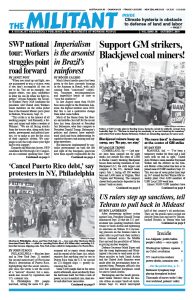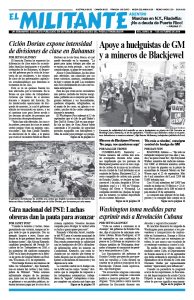“Cuba will not give in to slanders and blackmail,” from the U.S. government said Cuban Foreign Minister Bruno Rodríguez Sept. 20 at a press conference in Havana in response to Washington’s latest measures aimed at blocking Cuba’s supplies of oil and other products.
U.S. government officials who think that tightening the screws on Cuba will force a change in the principled politics of the Cuban Revolution are mistaken, said Rodríguez.
“They will not wrest any concession from our people nor any political concession from our government,” Rodríguez said. “This policy against our government has failed for six decades and it will keep failing.”
The foreign minister denounced Washington’s campaign to pressure fuel suppliers and shippers in South America, Europe, and North Africa from delivering oil, marking an escalation of its economic embargo against the island.
In the midst of these latest round of anti-Cuba moves, the State Department announced Sept. 19 that it had ordered the expulsion of two diplomats from Cuba’s Mission to the United Nations for allegedly conducting “influence operations.”
When asked by a reporter about the expulsions, State Department official Carrie Filipetti refused to “get into specifics on exactly what that means” but added the additional slander that the “Cuban regime violates the sovereignty of every country that it operates in.”
The State Department also announced that Cuba’s U.N. personnel will no longer be allowed to travel outside the island of Manhattan.
The Cuban Mission called the charges a “vulgar slander.” A Sept. 19 statement noted that when U.S. officials first raised the accusations, they gave Cuba 48 hours to respond. The Cuban Mission answered, but U.S. officials “in flagrant violation of basic principles of diplomatic protocol” rejected the Cuban reply in a tweet. The travel restrictions also violate U.N. agreements.
Harder times in Cuba
On Oct. 9, a previously announced $1,000 cap on money Cuban-Americans can send to their families in Cuba every three months goes into effect. Washington is also reinstating a ban on sending money to nonrelatives unless it is to be used to support a capitalist business venture in Cuba. In April, the Donald Trump administration announced it was reimposing some obstacles to U.S. travel to Cuba.
The new financial measures will make life more difficult for working people in Cuba already affected by a significant drop in lower-priced oil from Venezuela over the last three years.
In mid-September Cuban President Miguel Díaz-Canel announced cutbacks in bus and other transportation services aimed at confronting the fuel shortages. Granma’ s Sept. 20 issue featured an article on farmers in Granma province, in the east of the island, who are switching from tractors to oxen to reduce the amount of fuel used. There has also been intermittent shortages of basic products due to lack of hard currency to buy imported goods..
Washington’s accusations that Cuba is violating U.S. sovereignty are especially cynical in light of the U.S. government’s repeated violations of the sovereignty of Cuba. This includes its decadeslong economic war against Cuba and sponsorship of groups that have carried out numerous terrorist attacks against the island — and of dozens of other countries around the world.
The U.S. government’s aim is both to punish the Cuban people for overthrowing the U.S.-backed dictatorship of Fulgencio Batista in 1959 and to undermine the revolution in the hope of someday overturning it.
In November the U.N. General Assembly will once again vote on a resolution calling for an end to the embargo on Cuba. The resolution has passed by wide margins for 27 years in a row.

